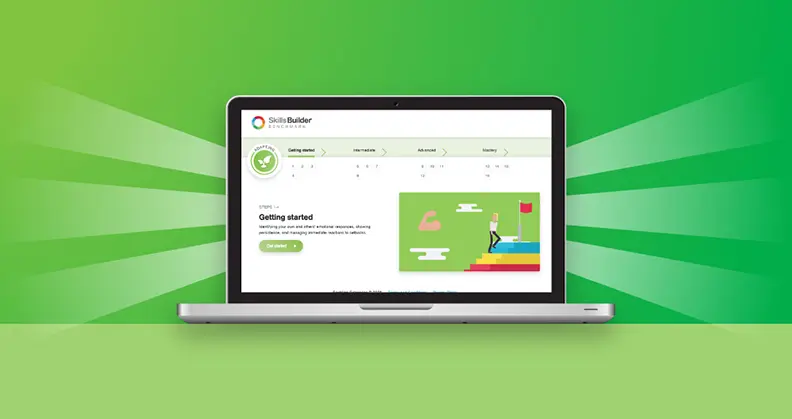Over the last decade, we’ve worked with employers, educators and youth organisations to create the national standard for essential employability skills. We partner with Movement to Work, who are also passionate about supporting organisations to provide quality work placement and training opportunities for young people aged 16-30 who are not in employment, education and training. Movement to Work are a strategic partner, and have also gained an Impact Level for their Young Person Welcome Pack resource.
Navigating the transition from education into employment
As a result of the pandemic, young people are more qualified and ambitious than ever before. Yet varied and complex reasons mean young people continue to be hard for employers to reach. We learned from the 2022 Youth Employability UK youth census that:
- 51% of young people looking for work thought their anxiety was the biggest barrier to accessing work.
- 28.5% of young people said they are experiencing ‘social, emotional and mental health challenges’ whilst young people recorded low ratings for ‘self belief’, 'confidence and motivation’, ‘staying positive’.
- Over half of young people think their biggest barrier to work will be a lack of work experience.
- 36% of young people in education have access to work experience.
- Less than a third of young people think employers are supportive of hiring young people.
- The language used in job hunting on application forms is overwhelming and intimidating. The use of corporate jargon, the long lists of required skills gives off the perception that the company has unrealistic expectations around previous experience and qualifications.
To add to this, Speakers for Schools recently revealed that students in private education were twice as likely to access multiple work experience placements. But they also uncovered the positive impact work experience can have on student outcomes, including salary potential and essential skills. Take this in combination with the recent Essential Skills Tracker research, which shows that people with higher levels of essential skills have higher wages, higher job satisfaction, higher life satisfaction and better social mobility, it seems reasonable that we might expect many more people involved in workplace provisions. Yet, the reality is that participation in work experience has declined over the past decade.
These findings are what drives both Movement to Work and Skills Builder Partnership to rally employers to provide quality work experience placements that young people can relate to and get value from.
For businesses and employers, these findings are difficult to overlook. Our Partners at Skills Builder often tell us they want their outreach programmes and CSR initiatives to be accessible to diverse members of their communities, but at the same time young people are experiencing significant barriers – feeling less motivated, anxious, and discouraged by employers’ language. Movement to Work has also highlighted the difficulty that businesses are facing in attracting young people to youth employability programmes and direct entry roles. This is not simply because of a tightening labour market. The fact remains that youth unemployment is almost 3x higher at 10.8% (or 247,000) than overall unemployment rates at 3.8%. In fact, there are an estimated 788,000 young people who are economically inactive – not in education, employment or training (NEET) – yet we’ve learned in our Essential Skills Tracker 2023 recent research that individuals with higher levels of essential skills are less likely to be out of work and education.
What can businesses do to address these challenges?
Businesses have a role to play in helping to shift this paradigm, so that young people can build the foundations to sustain a smoother transition in the future. In turn, businesses who address these challenges will reap the benefits of tapping into this vibrant, diverse, and talented youth workforce segment. For this to be achieved, there must be changes to the ways in which businesses recruit. For example, providing inclusive work experience opportunities that are linked to employment outcomes, recognising that many young people may require additional support when entering the workforce and access to mental health services for all employees.
From our perspective, we want to see employers placing an emphasis on essential skills. These eight highly transferable skills are distinct from others, like basic or technical skills and provide value in their own right.
The basic skills of literacy and numeracy are critical for individuals on a day-to-day basis and provide the foundations for success. Technical skills are incredibly valuable and enable us to complete the tasks we’re responsible for in our role. However, while technical skills are crucial, they lack transferability which leaves a gap for those essential skills that are part of almost any job role.
The language of the Universal Framework is an important tool that employers can use to bridge the gap between the worlds of education and work. If many young people are familiar with the Framework and understand the skills and these are also things that employers value and want in their future workforce, then it could form an important part of the solution.
Movement to Work equips organisations with the tools to successfully deliver a vocational employment or work experience programme, ensuring that the next generation of talent is being provided with the skills and support they need to succeed.
Our organisations are working together to embed the Skills Builder Universal Framework and essential skills into the Movement to Work Employer Toolkit. This guidance outlines a number of key elements which employers should consider when developing and running youth employability provision, to ensure they get the most out of their involvement with Movement to Work and offer the best experience possible to the young people on their programmes.
Embedding skills and opportunities in partnership with Skills Builder and Movement to Work
PwC and Skills Builder
Many employers are already embedding our Skills Builder approach into their work experience programmes. In December 2022, PwC was awarded the Bronze Excellence Mark, an award recognising organisations that demonstrate best practice in embedding essential skills.
PwC’s range of outreach initiatives and programmes help to enable people from lower socioeconomic backgrounds across the UK to make the most of their potential, whether at PwC or elsewhere. Working in collaboration, we reviewed PwC’s programme learning content and explicitly embedded essential skills throughout. PwC found this “fitted
seamlessly” into the content it already had. Using pre and post benchmarking, using Skills Builder’s Benchmark tool, participants were shown to make significant progress across all skills during their programme.
“Our work experience programmes are focused on equipping young people with the skills they need to be successful in their career of choice. Working with Skills Builder helped us to take a step back and focus on the skills we wanted to highlight in each of our programmes. Doing this has helped us make our offering attractive and relevant to our schools whilst also allowing us to engage with new schools who are familiar with the Framework.”
– Hollie Crompton, social mobility lead at PwC UK.
Accenture and Movement to Work
Movement to Work focuses on tailoring work experience placements to meet an employer's recruitment or CSR objectives, working with each employer to create a programme model that works for them.
Movement to Work partnered with Accenture on multi-week placements that provide employability skills and vocational training, including programming, testing and digital concepts. Accenture has successfully hired over 40 young people, the majority as technology apprentices (leading to a degree in Technology) and as experienced hires or graduates.
Now a Software Engineering New Associate at Accenture, Michelle Taylor was connected to Movement to Work through a job placement agency. Movement to Work gave her access to high quality digital training, work experience at Accenture’s London office and a path to entry level jobs.
Michelle says: “Accenture looked at me as an individual and saw my talents, even when I didn’t yet have the qualifications necessary for the role. It’s a relief to be able to support my children and I’m happy to be back in school. I’ll be the first person in my family to finish university.”
Taking your work experience provision to new levels
If you’re an employer or organisation working in work-related activity, there are many ways you can start gaining the benefits of using both Skills Builder and Movement to Work’s approaches.
- Employers and organisations can download a prospectus or arrange a free consultation with us to find out how essential skills can boost your provision.
- If you’re thinking about developing an employability programme for young people, contact Movement to Work for more information and support.






